#prince siddhartha
Explore tagged Tumblr posts
Text



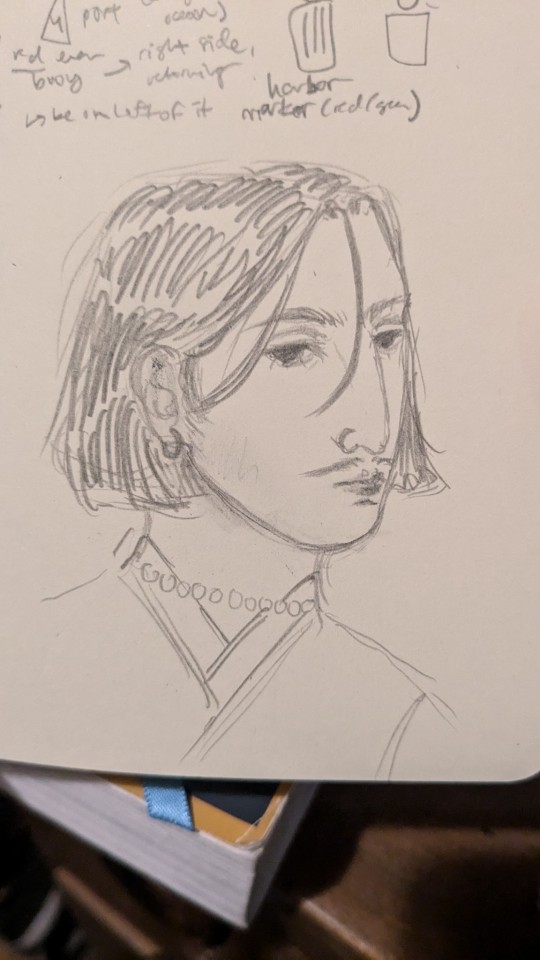


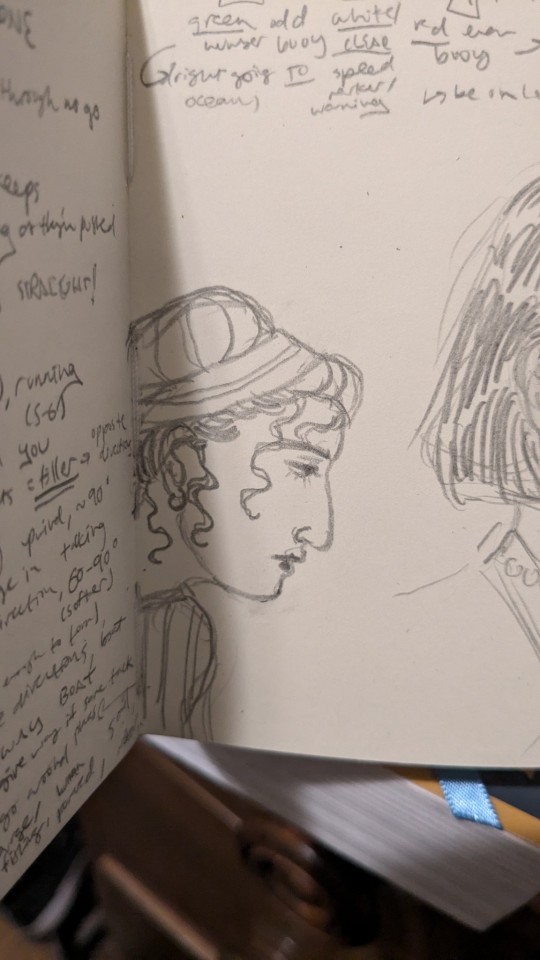

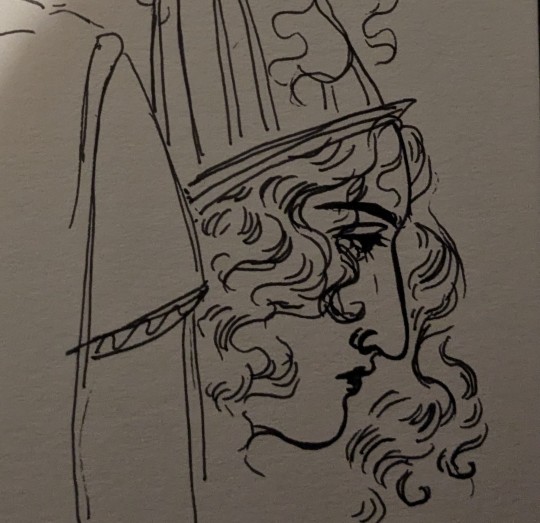
Comprehensive everything I've drawn (no non-lazy things I fear) in the last like 6 months compilation!!!! I love history
#charles vi#charles the vi of france#the mad king#guanyin#kannon#prince Siddhartha#buddhism#french history#medieval history#vasilisa the beautiful#slavic folklore#richard ii#hundred years war#lefty of poncho and lefty fame ..#cowboys..#early modern central india ocs for history class#historical ocs#my art
8 notes
·
View notes
Note
sup, how are u? Can you make a bot of keanu character from little Buddha movie? He was just so so beautiful in that movie LIKE DAMN
Hi! Here is the bot. I hope you like it and I hope that I did the character justice! I did see the movie but I had to do a bit of research for this one.
Here is the character.ai version:
Here is the janitor.ai version:
8 notes
·
View notes
Text

i love him btw. jsyk. like should you need to be aware
#this is vee speaking#I SCREAMED MY THROAT RAW DURING THE KUUKOUS FINAL CONFRONTATION#BUT THATS FOR A DIFFERENT POST LOL#like ghost kuukou owned that place lmao!!!! he didn’t lift a finger to fight his own battles until the end!!!!!!#he was like a little prince (siddhartha) and i loved that for him!!!!!!!!!!#the way his groupies i mean followers called him their hope oh i was crying lmao!!!!!#he’s personifying that sect of buddhism prefers to shut themselves away from the world in order to attain enlightenment it’s so cool!!!!!!!#i was not prepared to love two kuukous at once oh dear god my chest hurts my heart’s too full and idk how to pour any of it out—#uuuuuuuuuuuuuuuuuuuuuuuuuuuuuuuuuuuuuuuuuuuuuuuuuuuuuuuuuuuuuuuuuu…………………………………….#kuukou………………………… uuuuuuuuuuuuuuuuuuuuuuuuuuuuuuuuuuuuuuuu…………………………………………………..
10 notes
·
View notes
Text
Buddhism is funny cause it's just "tried to avoid suffering at all and it just made me sad so I decided to try suffering as much as I could and that also made me sad so clearly the perfect way to exist is to live directly in the middle of these two extremes." Like my dude you tried exactly two things, what if the secret of life was somewhere outside your incredibly specific binary spectrum.
#clearly this is extremely reductive and not representative of a breadth of Buddhist study#but i grew up in a bunch of tibetan buddhist temples cause of my mom#and the story of Siddhartha going from prince to ascetic before finding the middle way was always weirdly funny to me
5 notes
·
View notes
Text
Asking them if you’re their type
Featuring: Indra, Buddha, Okita, Hades ( part 2 )

Part 2 after taking a day off here.
Part 1 incase any of y’all missed it.
Warnings? None.
Indra
He was a mystery to everyone, even to you as well. Indra was the one who found you alone isolated from everyone else. He was laid back at first sight and you had thought he wanted to fight. This made you realize that there was someone else similar to you and noticed your existence.
You continuously watched him train around Brahma and Vishnu while he didn’t mind you watching you, he found it rather cute you followed him around curiously.
This made you and him grow rather close and fond over the years of being isolated from others and choosing to be in each other's silent comfort. He liked smoking and you didn’t mind him doing what he wanted. However, a part of him didn’t like Rudra making advances on you despite he didn’t know you already were Indra’s.
Indra had told him in a nice way to buzz off or else. You smiled while you stood back watching the two men fight. You were unaware of what they were talking about, but Rudra shrugged his shoulders before leaving the summit of Svarga.
You saw Indra sit down a bit farther from where you were. He didn’t look too happy but he grabbed another cigarette and lit it using his lightning. “What were you talking about? He looked upset?” You had asked while sitting next to him, but Indra had put one arm around your waist to pull you closer. Your face was flustered but you soon relaxed in his embrace.
“Do you like me being here?” You asked and he was silent for a moment.
“Ya? Why?” Indra puffed out some smoke. He brought one leg up to his chest to rest his other arm on his knee.
“I don’t know… it sometimes felt like I been annoying you too much. Sometimes I wonder if I’m your type or something…” you muttered even though he still was holding you.
He didn’t say anything but you could hear him clear his throat from the smoke. “If you annoyed me, I would’ve let Rudra have you.” He was a quiet man but that made your head perk up from his answer.
“Have me?” you didn’t know someone else was trying to pursue you. You were just a normal goddess of the Hindu pantheon.
“Stop worrying about that. Or whatever my type is. I like what I have right here,” he didn’t face you but you noticed the small curve in his lips turn upwards. You were satisfied and reassured that he likes living in the moment and preferred your company than being alone.
Buddha
You have known Siddhartha ever since King Jakata introduced you to him. You were a common lower-ranking girl with family and relatives who knew the King.
Jakata was a kind man who cared for his people and interacted with many commoners. However, you didn’t care for Prince Siddhartha in the beginning, but he acted like you must get to know him to like him. He was persistent and you were stubborn.
Siddhartha was the one that was blunt asking for your hand in marriage to end his arrangements with other high-ranking families that wanted to wed their daughters to him and get whatever they wanted. Wealth, fortune, and a nice home. You told him no, but he kept trying every day to see if you changed your mind.
Eventually, his annoying presence became your everyday routine. After King Jakata’s death, he wanted to travel and explore the vast limitless outside world and save humans from insufferable fate. He was going to forbid his farewell and never see you again. You asked him to take you with him to get away from your old life as well. You said this without thinking and immediately covered your face. Siddhartha laughed, but only on one condition and he would allow you to travel with him.
You have to accept his proposal to be his wife. This made you hesitate but you also wanted to leave your home desperately. You had agreed in the end just so you could leave your boring home.
After he left everything behind except for you, he started to oppose other religions that imposed fate upon innocent beings. He would protect humans and create his own religion. You watched him save others without any significant doubt. He obtained his enlightenment this way and you were slowly fascinated with this new man that calls himself the Buddha.
“Hey! Wait up!” you found him near a tree taking a break while eating and reading some novel. He didn’t even give you an eye glance but it didn’t bother you how absorbed he was with his book.
“Buddha-chan, why are you here? We were supposed to be travelling on the road.” You sat down next to him.
“Why? There’s no rush, sit and try these.” He offered you whatever he was eating. Dry peaches? Did he like these? Your eye twitched but you reluctantly tried the fruit and it had a really sweet flavour. You made a sour look after trying it. Buddha laughed at your reaction knowing you weren’t as fond of such treats.
You frowned before speaking, “may I ask you something?” You leaned more into him while your head was practically propped on his shoulder. He treated you with such care and always looked out for you whenever he could.
“Hmm?” he hummed.
“Why did you want me to be your wife for so long? You had everything handed to you and I had… nothing. I wasn’t anyone special. I didn’t think we were compatible together or if I was your type.” You heard him burst out into a laughing fit next to you causing you to jump.
“You looked kind of lonely, it’s not about having everything to keep myself happy. I bring happiness to others, I didn’t like seeing how sheltered you were. Anyway, enough of that, let's get going, ey? Also… stop with the gloomy look. I didn’t particularly understand the type question either.” His answer wasn’t what you had expected but you learned a few things while being with him, he cared a lot for others happiness, including yours. So he thought you wanted company?
“Why did you think I would ever want your company?” You stuck your bottom lip out as you pouted but he cupped your cheeks with both hands.
“I thought you already knew me by now. I told you before that you should get to know me first before judging.” He leaned his head against yours affectionately. Your face was red but he’s more affectionate when it’s nighttime.
Okita
You had known him since you two were kids. Kondo adopted him when he was nine years old after being abandoned by his sister. You were just another kid attending his dojo and looked after by Kondo. After hearing what happened to Souji, you felt incredibly sorry for him. You had told him if he ever needed someone, he could rely on you. Souji was a silent kid for a while and helped around the dojo. Whenever you needed help with something, he would immediately help you.
Over the years, you developed more feelings for him and what killed you on the inside is if he ever felt the same. You had previously turned down Nagakura who wanted to take you out for drinks. It honestly, broke your heart even more with how much you enjoyed being in his company while worrying if he thinks of you as an older sister.
As you were alone minding your own business cleaning the floors with the broom, Hijikata walked over to you unbeknownst to what he was gonna ask, “why are you cleaning? That’s Souji’s job,” he gave you an annoyed look as if you don’t live at the dojo. You had been cleaning the dojo before Souji even joined it.
“Let her clean. I’d rather the floors look nice than dirty,” Yamanami rolled his eyes. You heard Hijikata mutter ‘whatever’ before asking Heisuke to spar with him. This must’ve been the fifth time today he asked someone to spar against him and lost each time. You noticed Souji was outside with Kondo talking to one another.
Your heart clenched a bit as you held onto the broom tighter. Why couldn’t you say anything? You honestly wanted to know if he was even into girls, to begin with. He seemed more happy about swordsmanship than you anyway.
Nagakura walked over to you after his workout against Hajime. He placed one arm over your shoulders causing you to freeze in your place. “So… how about we go somewhere tonight?” Go somewhere? You looked behind you and saw Souji looking at you and Nagakura curiously. Oh no…
“N-No, I um… am busy tonight!” You stepped away politely declining him yet again. You know Souji watched that encounter and you have no words. You quickly disappeared to go back to your hidden spot outside away from everyone.
Great you finally were alone and noticed how quiet the area was. Maybe you can finally clear your head before heading back— “hey, why did you run off?” an awfully familiar voice said behind you. The leaves crunching under his feet were loud enough for you to scowl.
“I just wanted to be alone.” You turned your head but he didn’t say anything about the incident that occurred earlier. He stopped to look at what you were doing. You had grabbed some of the flowers and were picking the petals off of them.
“You don’t have to be here, you can go check back on Kondo-san.” You shrugged as you sat down by one of the trees. He walked over to you and decided to do what you were doing out of boredom as well. Was he just mimicking you? Souji always appreciated you and tried to make your day better if you were upset. He was always there if you needed someone.
“You don’t like Nagakura-san?” he finally brought the topic up. An awkward topic. You shook your head.
“Well, not in that way… I’m sure he will find someone. What about you? Don’t you have a type or interest in girls?” Your question took him off guard. He never really had time for such things and you were the only girl he really talked to.
“Type? I don’t know..”
“You don’t get the question?” you frowned.
“No, I do. I just don’t know what my type would be. Someone who’s nice? Likes cats? Who can eat Kondo’s food…” he was playing with your head again. You were all those things and yet he was smiling like an idiot thinking about it.
“So someone like me?” You pointed to yourself but you soon regretted that and quickly turned your head. His mouth gaped open without realizing what you meant. Were you joking?
“Hmm well… sure!” he chuckled which you hope he meant it.
“So that means you like girls?” you curiously asked and he tilted his head.
“Huh? You think I’m gay?”
“What—?! No! I was just curious…” you sulked your head lower from embarrassment.
“I like girls, so don’t worry about it.” he gave you the most innocent smile which brought you some reassurance. He certainly caught on to what you’ve been worried about. Thank god…
Hades
Living in the netherworld had many cons than pros. Yet, the most fun part was you got to do what you wanted but that was before Hades took over the shithole of Helheim. You practically couldn’t do what you wanted anymore. He kept questioning you and asking why you— a human was doing in Helheim. Even though he already knew the answer. You just liked dodging his questions.
You didn’t like him at all in the beginning and kept arguing with him. Why couldn’t he have ended you? Maybe he liked your presence or he missed your annoying face harping at him whenever you wanted.
Hades had put up with you for so long, that he even offered you to live in his castle seeing that you travelled a lot in the underworld. You got into many dangerous situations but you refused to live in his castle. However, to him, this seemed amusing how he is normally a feared man and you showed no signs of care about his existence.
“You’re infuriating, why do you keep finding me in the most odd places?” You sat down near the dark forest that was several miles away from his castle.
“You forget that I’m the King of the Netherworld. You’ve been disturbing some of the demons nearby. You’ll get yourself killed,” Hades sighed and was feeling hopeless with your stubbornness. He was supposed to protect this place and many of the monsters that resided in his world, wouldn’t dare attack him. However, they tried to attack you many times. The last time caused a significant wound near your side from the unexpected attack from a large hydra that nearly killed you.
“So what if I get killed, I was sent here to die anyway with no explanation whatsoever. I heard there’s even another human here as well,” you thought hard about who the human was named but you had forgotten.
“Michel Nostradamus? He destroyed part of the Bifrost. As for you? You strictly walked down here on your own somehow you passed the wall. Once you’re down here, you can’t ever return to Valhalla. You’re decisions seem stupid, however, if you need someone to talk to, you know where I am. And lastly, stop what you’ve been doing.” He warns and as he was about to turn away and return to his castle.
“Fine, it’s just boring. You’re one of the few that doesn’t try to kill me on sight.” You stood up on your feet.
“My invitation is still there if you wish to stay somewhere permanently under my rules.” He had a grin plastered on his face.
“Ya ya, whatever. I get it, Mr King of the Underworld..” you rolled your eyes. Under normal circumstances, anyone who dared to disrespect Hades would’ve been punished. He sighed, allowing you to follow him back. The walk back was mostly you talking nonstop and getting distracted by the things around you two.
The guards of his castle greeted Hades but scowled when they saw you with him. “Rude…” you pouted.
You noticed how the castle was dark on the inside and barely anyone lived in the castle other than himself and his brother Adamantine, which Hades had told you. “Looks incredibly depressing here. Don’t you have a wife to be your home decor? Everything seems so empty here,” you saw how dusty some of the cabinets were.
“Wife? I’m sure if I had one, she wouldn’t let you stay here.” You pretended to act hurt but muttered a whatever at his statement.
“Let me decorate these rooms then? Hm?” You offered but Hades waved you off to do whatever but not do anything chaotic.
The next few days you had changed around some of the rooms to look less creepy. You still continuously witnessed him alone in his room reading or making reports. You wondered what he even made reports for. How does he even rule over such a dead place? “What are you doing?” Hades saw you watching him from behind the door peeking over.
“Seeing how bored you are staring at a bunch of words on a sheet of paper.” You tilted your head to the side and smiled at him. He was irritated but it wasn’t enough to shout at you.
“Why don’t you give me company then? Only if you don’t try to get on my nerves,” He offered which you snorted and stepped into his sight.
“Okay!” You two sat a bit far apart except you were on a floor cushion and he sat in his chair. After a few minutes, you wanted to ask him why he chose to be alone.
“Doesn’t it get lonely here? Also, why isn't someone like you married? Actually, never mind. I don't think any woman would like to live in a creepy haunted castle… It’s honestly starting to make me worry,” you sucked in a breath. Hades raised a curious brow at your question. Lonely? Not married? He was used to it. There’s no women in the underworld and you were the only one.
“No,” he responded solemnly. “It doesn’t get lonely here. As for the other question, nobody had caught my eye.” He kept it vague and tried to avoid anything too personal about himself.
“Caught your eye? So that means you must have a type then! Like me? Cute and annoying?” You were making him want to snap his pen in half.
“Shut up or you can leave,” he wondered back on what you meant by type. He probably would feel more lonely without someone like you around. Did you keep him on his toes more? He was curious more about you and how strong are you. There were so many things he wanted to know and explore but take it slow.
“Fine.. I’ll leave.” You stood up realizing you ticked him off.
“Wait, why don’t you tell me more about yourself instead of asking your king dumb questions.” He gave you a smug look but you looked back at him and nodded. Of, course you’ll yap in his ears but he’ll get used to it. He hoped.

Note: wow this took 2 days… I’m sorry! I tried. I’m working on a few new one shots next. Dunno when part 3 will come yet.
#shuumatsu no valkyrie#ror x reader#shuumatsu no valkyrie x reader#record of ragnarok x reader#okita ror#okita snv#okita soji x reader#okita souji x reader#okita soji#okita souji#Indra#Indra ror#indra x reader#Indra record of ragnarok#hades#hades ror#hades x reader#hades snv#hades RoR x reader#Buddha#buddha snv#buddha ror#buddha x reader#buddha RoR x reader#record of ragnarok
227 notes
·
View notes
Text
The Yagasuri Panel's Meaning + Gojohime and Sprituality
Hello, everybody! I know I've been gone for the past two years but I'm finally back. With the release of the latest chapter I've been incredibly devastated but it still won't stop me from being delusional! Since there has been a lot of talk surrounding Gojo and Buddha, I've been doing some research, and I think I found something that potentially draws us closer to the meaning of the famous Yagasuri panel :)
CHAPTER 236 SPOILERS AHEAD

As a quick refresher, the pattern displayed in the background of Gojo and Utahime is a traditional Japanese pattern called yagasuri. According to the sources I found on the internet, the arrows are related to archery, and thus were a common pattern on male clothing. The design represents the unwavering nature of an arrow because once it is shot, it will never return. Brides in the Edo period wore the pattern as a symbol of good luck, ensuring that they will not have to return to their families. Additionally, in Buddhism, the arrows embody the fight against evil.
There are a few interesting things I'd like to point out about the information above. For one, from all the pictures I've seen, the arrows in the yagasuri pattern are typically pointed downward, whereas in the cover, they are pointed from Gojo toward Utahime. Two, the pattern's relation to Buddhism and Buddha. Since there are many parallels to Gojo and Buddha, I went on a quest to research more about the story of Buddha (Prince Siddhartha) out of my own curiosity. What's fascinating is that supposedly in his early life, he won his wife, Princess Yasodhara, in an archery contest. They were married at an early age and had a newborn son when Prince Siddhartha was 29. Unfortunately, he leaves his family behind to embark on a journey toward enlightenment.
Aren't these details crazy?
Buddha's wife was a princess. Utahime means song princess/diva/songstress.
Both couples share a connection with archery/arrows.
Gojo is currently 29 years old in the manga and is theorized to reach enlightenment soon (assuming he truly is following the path of Buddha).
BUT THERE IS MORE.
Apparently, Yasodhara has been Buddha's wife for many lifetimes. While there are numerous stories of the two's history in their past lives, the one I'd like to bring attention to is from The Collective Sutra of the Buddha's Past Acts. The text recounts the first time Prince Siddhartha comes into contact with Yasodhara in a previous life as a Brahmin (Hindu priest) by the name of Sumedha, while she was a woman named Sumidha. As he waits for Buddha Dipankara to arrive to the city of Paduma, Sumedha decides to buy flowers as an offering. He then discovers that the king bought all the flowers as his own offering to the Buddha, much to his dismay. But in the corner of his eye, he spots a beautiful young girl with 7 lotuses in her hands and offers to buy one from her. The girl, Sumidha, vows to give 5 of her lotuses to him in exchange for being his wife in all of their next lives. In another version, Sumedha and Sumidha went to a city where Buddha Dipankara was expected to visit. He then asks her for one of her flowers to throw as an offering to the Buddha. She then asks him to throw another one in her behalf. Buddha Dipankara summons the two and reveals that they will remain connected for many lifetimes and help each other attain enlightenment.
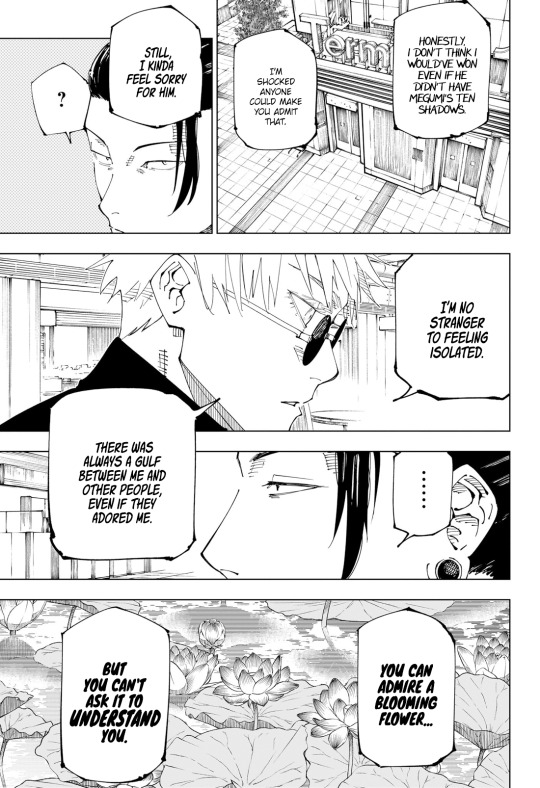
In the latest chapter, we see a panel of lotuses. From what is visible, there are 7 flowers. 7 flowers? 7. Flowers. I also think it's a funny coincidence how Sumidha promises to give Sumedha 5 flowers due to the fact that we associate Gojo with the number 5 because of the kanji in his name.
Just like Prince Siddhartha and Princess Yasodhara, I believe Gojo and Utahime are connected by fate. In the manga, whenever Utahime appears, it is almost always in relation to Gojo. They are made to contrast each other in almost everything besides motivations. Their color palettes, the schools they teach at, their values, and positioning in the jujutsu hierarchy. These are not coincidences.
And yet, despite all these differences, there seems to be a mutual level of trust between the two of them that transcends their usual bickering dynamic. Utahime has no obligation to help Gojo, but she does anyway. She CHOOSES to help him because she understands they share a common goal: protecting and nurturing the students. On Gojo's side, he CHOOSES to request a helping hand from Utahime first. Out of all people, he wanted to reveal his suspicions to her first. While Utahime provides assistance when she can, Gojo looks out for her when he can.
He claims that it is a pain to look out for the weak, but he continues to protect her. Gojo and Utahime put their lives at risk helping each other because they TRUST each other.

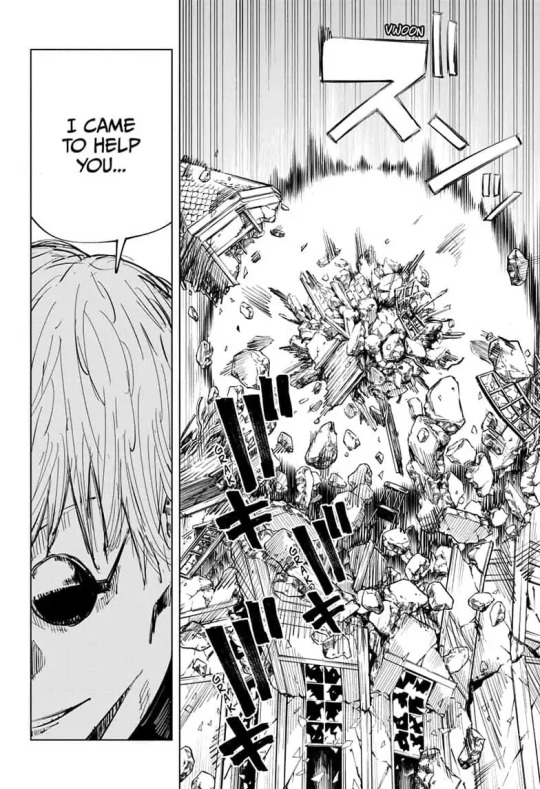
If my theory is true and it turns out that they are connected by fate, it would explain the unusual direction of the yagasuri in chapter 34. No matter how many lifetimes have passed, the soul of Gojo will always return to Utahime, just like how Sumedha promised Sumidha that he will marry her in every life. And the soul of Utahime will remain assisting him toward the journey of enlightenment.
I'm not saying they're married or anything but their relationship honestly parallels Prince Siddhartha and Princess Yasodhara so well. Although both of their stories appear to lead to the man's quest for enlightenment, they nonetheless serve as compelling illustrations of the power of a relationship founded on mutual trust.
___________
I might add on to this post later on if I feel like I missed something, but let me know what you think! :D These reaches are my specialty so be sure to take it with a grain of salt and don't take it too seriously. It's all in great fun :3
288 notes
·
View notes
Text
In the night, all cats are gray
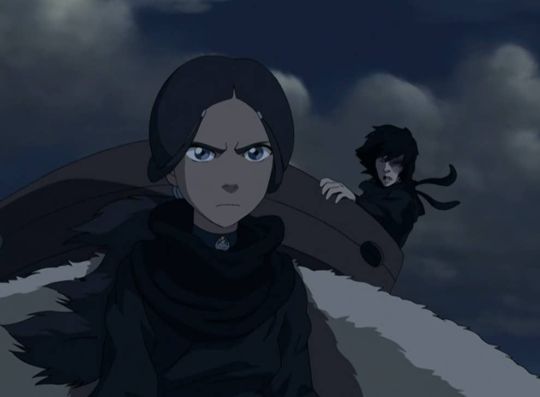
The phrase comes from the French, la nuit, tous les chats sont gris, and has also been attributed to Benjamin Franklin, in a letter to a friend in which he says that appearances don't matter when it comes to attractiveness. The phrase has also been used in reference to social standing or personal accomplishments, the meaning being that all people are the same in the dark.
The idea is that darkness reveals our true selves, a theme found in many different cultures.
In the above screenshot, Zuko and Katara are both dressed in black, and under cover of night.
In the world of atla, in which color represents nationality, Zuko and Katara are not acting as arbiters of their nations. Zuko, the former prince of the Fire Nation, who willingly left his nation to join team Avatar, is shown wearing black in a previous episode to hide his appearance. While the others dress themselves in red, disguised as Fire Nation citizens, Zuko appears to have no country of origin, symbolizing his renouncement of loyalty to the Fire Nation regime, as well as his renouncement of his social status as prince (which also echoes the story of Siddhartha Buddha).
So for Zuko, wearing black already has a particular meaning and association with his redemption.
For Katara, black is the color of night, which is heavily associated with her element. Katara is most connected to water through her bending, and linked to the moon. She is like her bending, a representation of the changeability of water, the darkness of night, and burns with the passion of the full moon. Like the night and the deepest depths of the ocean that is her element, Katara also can be dangerous, and like the moon, she has a hidden shadow side that is revealed especially in this episode.
So here Zuko and Katara are, bathed in the shadow of night which transforms them as equals, two children avenging their mothers.
Water, night, and the moon are also associated with the feminine (waterbending also being based on the more feminine martial art of tai chi), so this being a quest linked to motherhood is important. This episode also heavily deals with the dark feminine, a concept used to define primal instincts and emotions. Katara avenging her mother while bathed in her element is an aspect of the dark feminine, and so is Zuko letting Katara take the reins just as his mother committed murder and treason under cover of night to save him when he was a child.
Circling back to the original phrase being about the elimination of the barriers between social class or physical appearance (something also significant for Zuko, who is physically marked by his scarred face), it's not surprising that this episode is also considered one of the big zutara episodes. The original phrase is about romance (actually, it's about sex, but we'll keep it pg here), which is also something governed by the dark feminine and its symbols, which all appear in this episode.
#zutara#the southern raiders#zuko#katara#elemental symbolism#in the night all cats are gray#atla meta#the dark feminine
188 notes
·
View notes
Text
Introduction to Yasodhara, Wife of the Buddha.
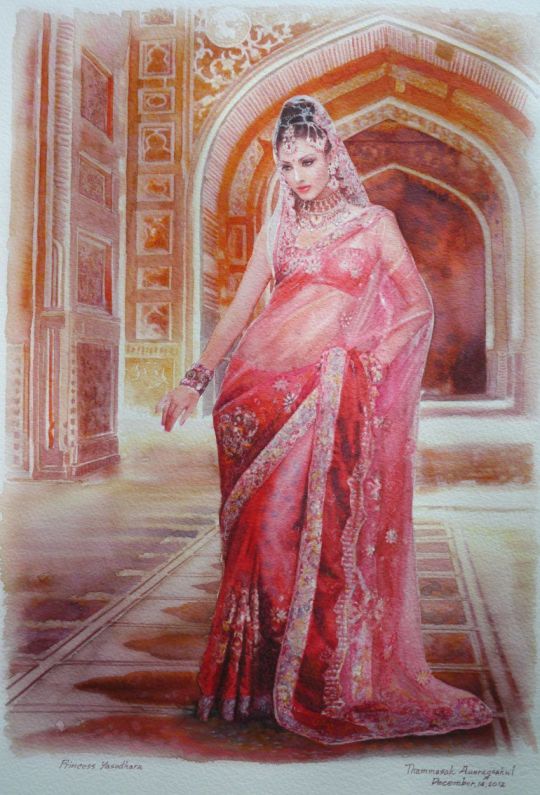
Yasodhara was the wife of Siddhartha Gautama (The Buddha). She became a Buddhist nun and was considered as an arhat (Buddhist saint)
The meaning of her name is "Bearer of glory". She was also popularly known as Bhaddakaccana, Rahulamata, etc…
Yasodhara has lived with the Buddha in his past lives, being his wife in all of them. In their past lives, she helps the Buddha and always stays devoted to him. In many of her lives, she rarely did bad acts/bad karma, making her one of the most holiest women in Buddhism.
She is an arhat associated with beauty, insight, womanhood, glory & devotion. Called "foremost in great insight"
She, in some unknown stories, was associated with Magic
Her (slightly summarized) life story 👇
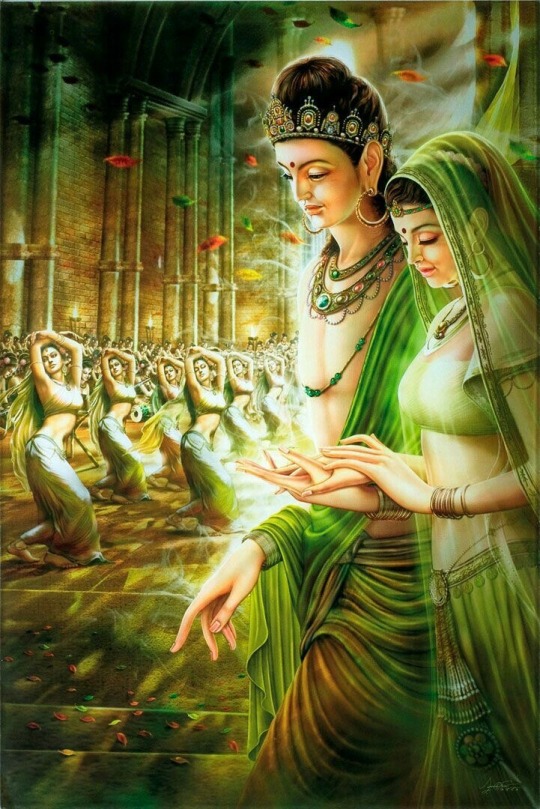
Yasodhara was the daughter of King Suppabuddh & Queen Amita, She was born on the same day as prince Siddhartha. She was said to be a very beautiful Princess who was devoted, pleasant & sympathetic.
When Siddhartha was 16, his father wanted him to marry a benevolent & unjealous girl. Later, at a marriage event, Yasodhara was seen as the right person of that, After a series of events, Siddhartha & Yashodhara got married.
Yasodhara gave birth to a son named Rahula when she was 26. 7 days after, Siddhartha left the palace to seek answers, leaving Yasodhara devastated. When he was away, She imitated her husband's lifestyle by wearing simpler clothes, eating only 1 meal a day, & refusing offers of marriage proposals.
After a few years, Buddha later went back to his wife, where she rushed to him and clung to his feet. Eyes full of tears, missing his presence, now Fulfilled to see him again.
Yasodara recited the 'Naraseeha Gatha' to her son Rahula before sending him to join the Buddha. Rahula was joyful in his father’s presence & went with him to the temple. Rahula later became a monk & attained Arhantship. Yasodara's life is marked by sorrow & tears, but she has never shown anger.
Yasodhara joined the order of Monks, became an arhat, & established the first nun Order with 500 women. She dedicated her life to spreading Buddha's teachings & focusing on good karma.
Other stories of Yasodhara:
1. Yasodhara & the shakyan nuns.
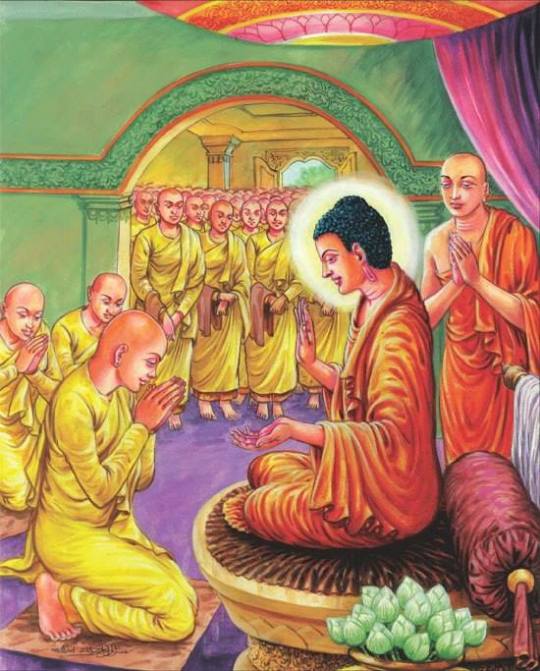
When Rahula became a monk, Yasodara asked for permission from King Suddhodana to become ordained. The king advised her to wait for the right time. After his passing, Mother Gotami obtained the higher ordination & started the ‘order of nuns’ in the Buddha’s dispensation. Yasodara eventually renounced her possessions and became a nun, along with a thousand Shākyan ladies, despite the extreme protests from her people.
She, & other Shakyan princesses who became nuns, received immense offerings and attention from devotees. Many royal figures and noble women became nuns under Yasodhara’s guidance.
2. Yasodhara’s Glory.
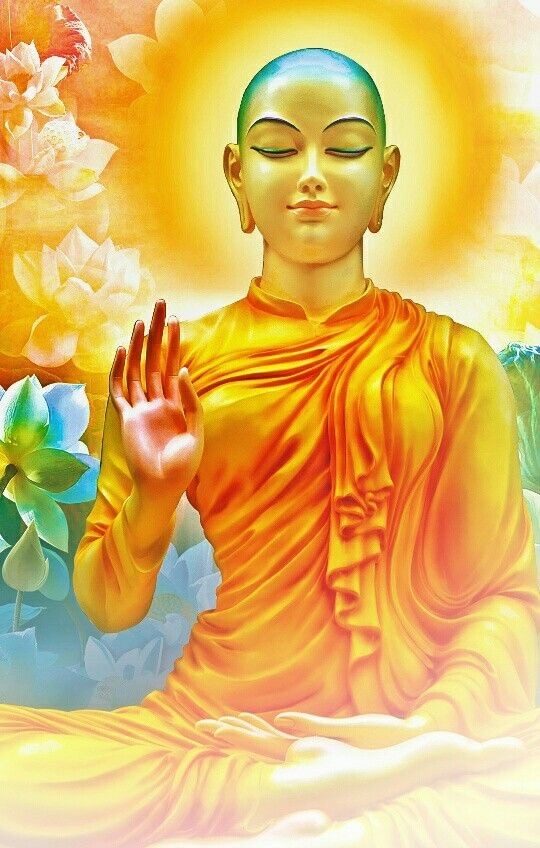
(this could possibly be a folk-story)
In order to prove her powers, Yasodara, in her spiritual form, performed numerous miracles, In the miracles, she’s said to have a voice that could be heard by the gods & brahmas who were dwelling in tens of thousands of universes. She transformed into different types of forms, into different elements, the sun, moon, mount Meru, & the god Indra.
She created a gigantic elephant and then plucked a divine tree from the realm Svarga (heaven), offering it to the Buddha like an umbrella.
She then attained nirvana, & was praised for her unwavering devotion and merits accumulated over countless lifetimes, a stupa was built to honor her legacy.
3. The princess’s love magic.
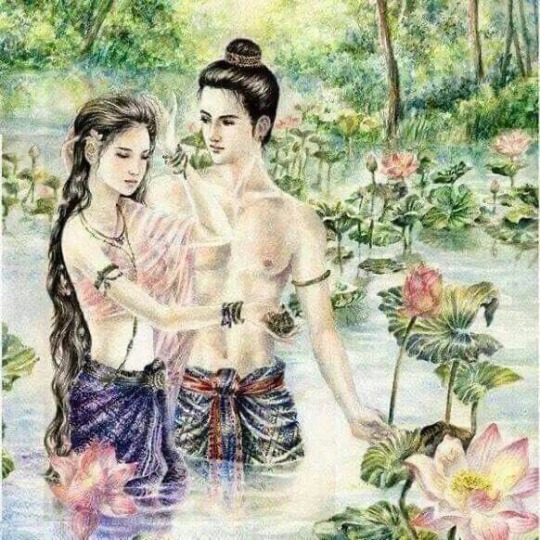
In one unknown story, when the buddha came back, Yasodhara tries to win back the Buddha by offering him a cake with medicinal herbs to change his feelings, she preformed love magic on the food and had her son offer it to the Buddha. However, the Buddha remain unaffected and tells a story from a past life where Yasodhara, as a seductive courtesan, had led him astray with a similar cake.
4. Yasodhara’s innocence.
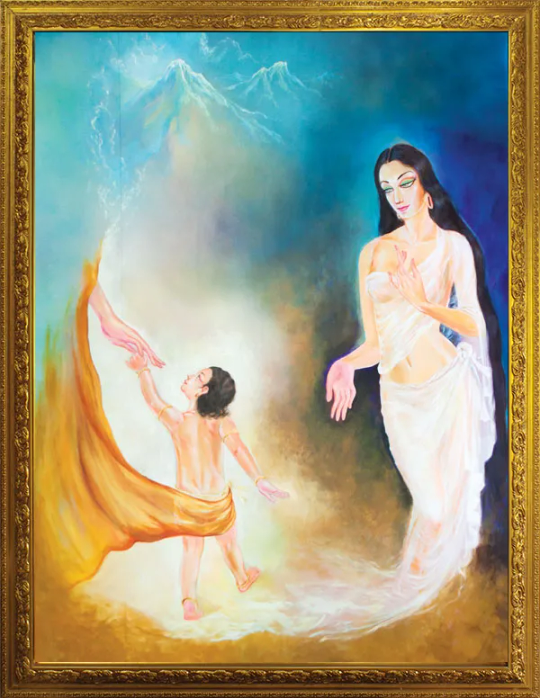
In the Tsa pao tsang king, it states that As a result of Yasodhara’s prolonged pregnancy, she was suspected of adultery by her father-in-law and the Sakyas. They dug a ditch filled with flaming wood and threw Yasodhara into it. She called upon the Buddha, the flaming ditch was instantaneously transformed into a pool of pure water, in the middle of which Yasodhara with Rahula in her arms was sitting on a lotus flower.
The Sakyas were convinced of her innocence and Rahula became the favorite of his grandfather.
5. Kama
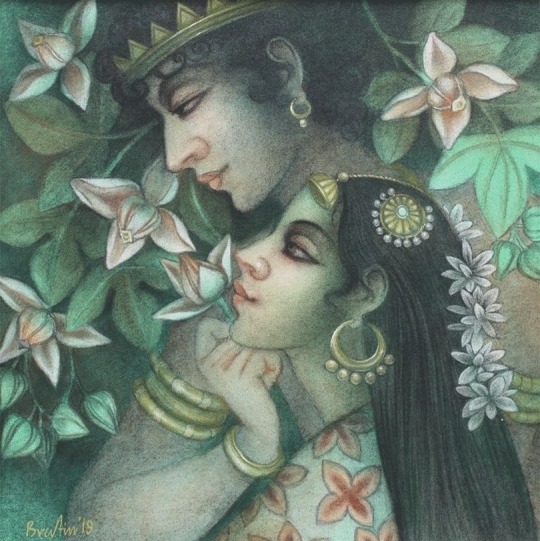
Prince Siddhartha would have practiced his cult of sexual magic (possibly tantric sex?) with Yasodhara. Both of them would often engage in sexual activities before they were ready to bring a baby.
There is also one story of them having intercourse on a palace roof. They were so into the act that they actually fell off the roof & didn't notice. They somehow managed to fall into a bed of lotus flowers which saved them from any injuries as a result of the fall.
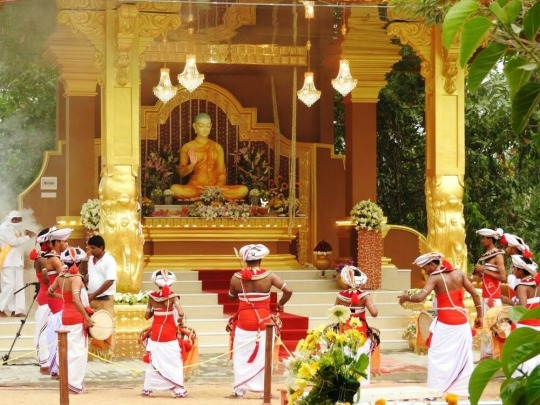
"Sri Yasodara Maha Seya" is a peaceful temple/stupa in Sri Lanka that honors her. Devotees seek the protection & blessings of her which help them overcome obstacles in life.
Nuns are mostly the ones who take refuge in her, meditating in front of her stupa or making offerings. There are also energetic festivals in honor of her, with dancing, music & chanting. Poojas are also in honor of her.
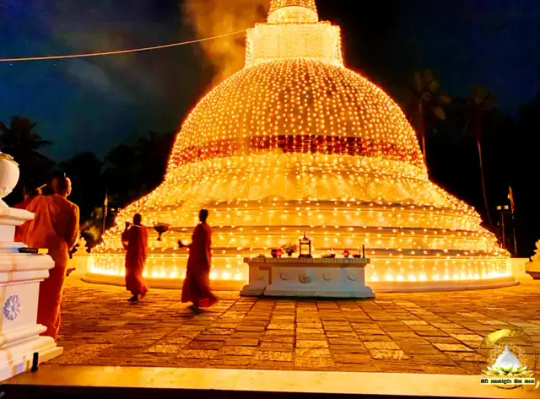
Namo Sri Yasodhara maa🙏
#Buddhism#yasodhara#yashodhara#rahulamata#Bhaddakaccana#Bimbadevi#Theri#Buddha’s wife#stories#arhat#Arahat#Arhati#Princess#Desi#desiblr#buddhistwitch#buddhist temple#buddhist art#dharma#Stupa#Sri Yasodara Maha Seya#buddha
24 notes
·
View notes
Text

"When people were lost in the
forest of belief that liberation can be achieved by going to special places, reciting special mantras, performing special ceremonies, that time, the LORD BUDDHA came to discover and preach this very simple message that, giving up self-interest, spreading kindness to all beings, from the heart.
Liberation is only achieved by the destruction of desire;
Not by going to any place, or bathing in water, or making oblations in fire, or chanting mantras. This is very simple talk's to hear, but to discover this spiritual word, a prince (SIDDHARTHA GAUTAMA) had to leave his kingdom and wander through deep forests and paths. "
So, The Buddha, the Enlightened One, was often approached by people of different views. To them he would say, "Let us set aside our differences. Let us give attention to what we can agree on, and let us put it into practice Dhamma life."
may everyone be blessed with good health, happiness, prosperity and attainment of supreme wisdom.
25 notes
·
View notes
Text



Buddhism Siddhartha Gautama, the founder of Buddhism who later became known as “the Buddha,” lived during the 5th century B.C.
Gautama was born into a wealthy family as a prince in present-day Nepal. Although he had an easy life, Gautama was moved by suffering in the world.
He decided to give up his lavish lifestyle and endure poverty. For nearly six years, he undertook fasting and other austerities, but these techniques proved ineffectual and he abandoned them. He eventually promoted the idea of the “Middle Way,” which means existing between two extremes. Thus, he sought a life without social indulgences but also without deprivation.
After regaining his strength, he seated himself under a Bodhi tree in west-central India and promised not to rise until he had attained the supreme enlightenment. After fighting off Mara, an evil spirit who tempted him with worldly comforts and desires, Siddhartha reached enlightenment, becoming a Buddha at the age of 35. He spent the rest of his life teaching others about how to achieve this spiritual state.
When Gautama passed away around 483 B.C., his followers began to organize a religious movement. Buddha’s teachings became the foundation for what would develop into Buddhism.
In the 3rd century B.C., Ashoka the Great, the Mauryan Indian emperor, made Buddhism the state religion of India. Buddhist monasteries were built, and missionary work was encouraged.
Over the next few centuries, Buddhism began to spread beyond India. The thoughts and philosophies of Buddhists became diverse, with some followers interpreting ideas differently than others.
In the sixth century, the Huns invaded India and destroyed hundreds of Buddhist monasteries, but the intruders were eventually driven out of the country.
Islam began to spread quickly in the region during the Middle Ages, forcing Buddhism into the background. Nonetheless, Buddhism eventually spread to Central and Southeast Asia, China, Korea, Japan and, in the 20th century, to the West.
Buddhism Beliefs and Practices
Some key Buddhism beliefs include: Followers of Buddhism don’t acknowledge a supreme god or deity. They instead focus on achieving enlightenment—a state of inner peace and wisdom. When followers reach this spiritual echelon, they’re said to have experienced nirvana.
The religion’s founder, Buddha, is considered an extraordinary being, but not a god. The word Buddha means “enlightened.”
The path to enlightenment is attained by utilizing morality, meditation and wisdom. Buddhists often meditate because they believe it helps awaken truth.
There are many philosophies and interpretations within Buddhism, making it a tolerant and evolving religion.
Some scholars don’t recognize Buddhism as an organized religion, but rather, a “way of life” or a “spiritual tradition.”
Buddhism encourages its people to avoid self-indulgence but also self-denial.
Buddha’s most important teachings, known as The Four Noble Truths, are essential to understanding the religion.
Buddhists embrace the concepts of karma (the law of cause and effect) and reincarnation (the continuous cycle of rebirth).
Followers of Buddhism can worship in temples or in their own homes.
Buddhist monks, or bhikkhus, follow a strict code of conduct, which includes celibacy.
There is no single Buddhist symbol, but a number of images have evolved that represent Buddhist beliefs, including the lotus flower, the eight-spoked dharma wheel, the Bodhi tree and the swastika (an ancient symbol whose name means “well-being” or “good fortune” in Sanskrit).
Types of Buddhism Today, many forms of Buddhism exist around the world. The three main types that represent specific geographical areas include:
Theravada Buddhism: Prevalent in Thailand, Sri Lanka, Cambodia, Laos and Burma
Mahayana Buddhism: Prevalent in China, Japan, Taiwan, Korea, Singapore and Vietnam
Tibetan Buddhism: Prevalent in Tibet, Nepal, Mongolia, Bhutan, and parts of Russia and northern India
Zen Buddhism is a form of Mahayana Buddhism that’s practiced in many of the same areas. It emphasizes simplicity and meditation—the word “zen” means meditation—in lieu of religious scripture, ceremonies or doctrines.
Nirvana Buddhism is closely related to Theravada Buddhism, but the concept of nirvana is also central to many paths of Buddhism. The term nirvana means “blowing out,” as a candle is blown out, thus ending all attachment and desire to achieve a state of pure enlightenment.
Each of these types reveres certain texts and has slightly different interpretations of Buddha’s teachings.
Some forms of Buddhism incorporate ideas of other religions and philosophies, such as Taoism and Bon.
Dharma Buddha’s teachings are known as “dharma.” He taught that wisdom, kindness, patience, generosity and compassion were important virtues.
Specifically, all Buddhists live by five moral precepts, which prohibit:
Killing living things Taking what is not given Sexual misconduct Lying Using drugs or alcohol
Four Noble Truths The Four Noble Truths, which Buddha taught, are: The truth of suffering (dukkha) The truth of the cause of suffering (samudaya) The truth of the end of suffering (nirhodha) The truth of the path that frees us from suffering (magga)
Collectively, these principles explain why humans hurt and how to overcome suffering.
Eightfold Path The Buddha taught his followers that the end of suffering, as described in the fourth Noble Truths, could be achieved by following an Eightfold Path.
In no particular order, the Eightfold Path of Buddhism teaches the following ideals for ethical conduct, mental disciple and achieving wisdom:
Right understanding (Samma ditthi) Right thought (Samma sankappa) Right speech (Samma vaca) Right action (Samma kammanta) Right livelihood (Samma ajiva) Right effort (Samma vayama) Right mindfulness (Samma sati) Right concentration (Samma samadhi)
Buddha by Talon Abraxas
20 notes
·
View notes
Text
How many of these "Top 100 Books to Read" have you read?
(633) 1984 - George Orwell
(616) The Great Gatsby - F. Scott Fitzgerald
(613) The Catcher In The Rye - J.D. Salinger
(573) Crime And Punishment - Fyodor Dostoyevsky
(550) Catch-22 - Joseph Heller
(549) The Adventures Of Tom And Huck - Series - Mark Twain
(538) Moby-Dick - Herman Melville
(534) One Hundred Years Of Solitude - Gabriel Garcia Marquez
(527) To Kill A Mockingbird - Harper Lee
(521) The Grapes Of Wrath - John Steinbeck
(521) Lolita - Vladimir Nabokov
(492) Pride And Prejudice - Jane Austen
(489) The Lord Of The Rings - Series - J.R.R. Tolkien
(488) Brave New World - Aldous Huxley
(480) Ulysses - James Joyce
(471) Jane Eyre - Charlotte Bronte
(459) Wuthering Heights - Emily Bronte
(398) The Brothers Karamazov - Fyodor Dostoyevsky
(396) Great Expectations - Charles Dickens
(395) To The Lighthouse - Virginia Woolf
(382) War And Peace - Leo Tolstoy
(382) The Sun Also Rises - Ernest Hemingway
(380) The Sound And The Fury - William Faulkner
(378) Alice's Adventures In Wonderland - Series - Lewis Carroll
(359) Frankenstein - Mary Wollstonecraft Shelley
(353) Heart Of Darkness - Joseph Conrad
(352) Middlemarch - George Eliot
(348) Animal Farm - George Orwell
(346) Don Quixote - Miguel de Cervantes Saavedra
(334) Slaughterhouse-Five - Kurt Vonnegut
(325) Les Misérables - Victor Hugo
(320) Harry Potter - Series - J.K. Rowling
(320) The Chronicles Of Narnia - Series - C.S. Lewis
(317) Anna Karenina - Leo Tolstoy
(308) Lord Of The Flies - William Golding
(306) Invisible Man - Ralph Ellison
(289) The Golden Bowl - Henry James
(276) Pale Fire - Vladimir Nabokov
(266) Gone With The Wind - Margaret Mitchell
(260) The Count Of Monte Cristo - Alexandre Dumas
(255) The Hitchhiker's Guide To The Galaxy - Series - Douglas Adams
(252) The Life And Opinions Of Tristram Shandy, Gentleman - Laurence Sterne
(244) Madame Bovary - Gustave Flaubert
(237) Vanity Fair - William Makepeace Thackery
(235) The Trial - Franz Kafka
(233) Absalom, Absalom! - William Faulkner
(232) The Call Of The Wild - Jack London
(232) Emma - Jane Austen
(229) Beloved - Toni Morrison
(228) Little Women - Louisa May Alcott
(224) A Passage To India - E.M. Forster
(215) Dune - Frank Herbert
(215) A Portrait Of The Artist As A Young Man - James Joyce
(212) The Stranger - Albert Camus
(209) One Flew Over The Cuckoo's Nest - Ken Kesey
(209) The Idiot - Fyodor Dostoyevsky
(206) Dracula - Bram Stoker
(205) The Picture Of Dorian Gray - Oscar Wilde
(197) A Confederacy Of Dunces - John Kennedy Toole
(193) Mrs. Dalloway - Virginia Woolf
(193) The Age Of Innocence - Edith Wharton
(193) The History Of Tom Jones, A Foundling - Henry Fielding
(192) Under The Volcano - Malcolm Lowry
(190) The Odyssey - Homer
(189) Gulliver's Travels - Jonathan Swift
(188) In Search Of Lost Time - Marcel Proust
(186) Midnight's Children - Salman Rushdie
(185) An American Tragedy - Theodore Dreiser
(182) The Book Thief - Markus Zusak
(180) Siddhartha - Hermann Hesse
(179) The Magic Mountain - Thomas Mann
(178) Things Fall Apart - Chinua Achebe
(178) Tropic Of Cancer - Henry Miller
(176) The Outsiders - S.E. Hinton
(176) On The Road - Jack Kerouac
(175) The Little Prince - Antoine de Saint-Exupery
(173) The Giver - Lois Lowry
(172) Brideshead Revisited - Evelyn Waugh
(172) A Clockwork Orange - Anthony Burgess
(171) Charlotte's Web - E.B. White
(171) The Ambassadors - Henry James
(170) Infinite Jest - David Foster Wallace
(167) The Complete Stories And Poems - Edgar Allen Poe
(166) Ender's Saga - Series - Orson Scott Card
(165) In Cold Blood - Truman Capote
(164) The Wings Of The Dove - Henry James
(163) The Adventures Of Augie March - Saul Bellow
(162) As I Lay Dying - William Faulkner
(161) The Hunger Games - Series - Suzanne Collins
(158) Anne Of Greene Gables - L.M. Montgomery
(157) Atlas Shrugged - Ayn Rand
(157) Neuromancer - William Gibson
(156) The Help - Kathryn Stockett
(156) A Song Of Ice And Fire - George R.R. Martin
(155) The Good Soldier - Ford Madox Ford
(154) The Da Vinci Code - Dan Brown
(153) I, Claudius - Robert Graves
(152) Wide Sargasso Sea - Jean Rhys
(151) The Portrait Of A Lady - Henry James
(150) The Death Of The Heart - Elizabeth Bowen
#books#book lists#p#im posting this so i can reblog it with my own crossed out list and i encourage others to do the same if you want to#i dont actually know how many ive read yet myself
35 notes
·
View notes
Text

𝝑୧ 𝒫𝑅𝐼𝒩𝒞𝐸 𝒮𝐼𝒟𝒟𝐻𝒜𝑅𝒯𝐻𝒜 𝐵𝒪𝒯𝒮



Childhood best friends with the servant.
- CHARACTER.AI | JANITOR.AI
6 notes
·
View notes
Text
A brief study of Buddhist symbolism and Japanese mythology in Sukuna’s character:
➠ Sukuna, the fallen.
There is a recurrent figure in Buddhist texts known as Mara, the demon King of the Sixth Realm. His Japanese name Akuma (悪魔) is the same as Satan in Japanese Christianity and the uses of the word outside of the Buddhist texts, also appears in literary works, especially those written during the Heian period. In Japanese Buddhism, Akuma is typically depicted as an entity with a fiery head and flaming eyes, and carrying a sword, but the initial depiction of Mara shows some similarity to Sukuna’s design as a character.
Here are illustrations of Mara for reference (1st one is Mara and the 2nd one is his demons):
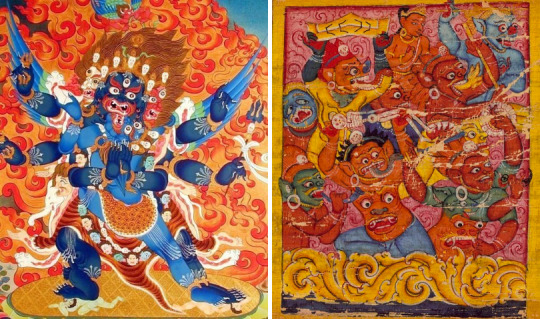
Now, who is Mara?
He is a malevolent king, associated with death, rebirth and desire, who continuously tried to stop Prince Siddhartha (Buddha) from attaining Enlightenment and is the personification of the forces antagonistic to it. During his final encounter with Siddhartha, Mara is said to have challenged him to a duel to determine who would become Enlightened and lost, in that sense he is seen as the one who failed to achieve Enlightenment (i.e. fallen from the path of Enlightenment).
Here is another depiction of Mara with meditating Siddhartha:

Continuing, ‘Buddha defying Mara’ is a common pose of Buddha sculptures, where the Buddha is shown with his left hand in his lap, palm facing upwards and his right hand on his right knee. The fingers of his right hand touch the earth, to call the earth as his witness for defying Mara and achieving Enlightenment.
I believe that within the world of sorcerers, Sukuna represents a similar being. He is the one you must bypass to attain ‘Enlightenment’ (I know some believe that Sukuna is the Enlightened one, but this point can be argued because of what it means to walk the path of the Enlightenment), because he personifies the temptations a sorcerer could attain if they were to forsake their ideals. In that same sense, Yuuji is the one who challenges him in a similar manner we see between Mara and Siddhartha: his soul refuses to bend, and he will not stray from the path (the ideals) he has chosen no matter what violence or pain Sukuna inflicts upon him. Sukuna once compared Yuuji to someone from the past, which I think implies that in the past, someone challenged Sukuna in a similar manner Yuuji has, which might, in a way, explain why he harbours such strong dislike (which is the sole case he outwardly shows such emotion in the entirety of the manga) toward Yuuji as a sorcerer. It also implies that in the world where Sukuna exists, so does the ‘force’ opposite him to create a balance.
This point takes me back to the note I made on Yuuji and Sukuna years ago, drawing a connection to the ‘Legend of the Twin Baku’. It tells the story of twin Baku brothers named Aoi, the Blue and Akai, the Red, who fed on the dreams of mortal creatures. Akai preferred the sweet-tasting good dreams. Aoi, on the other hand, preferred the bitter-tasting nightmares. He grew more and more vain with every nightmare he devoured, and so did his hatred for mortals. To enact revenge, he approached his brother, Akai, as he slept peacefully, and began to consume the dreams of his brother. Since Baku eat only dreams, their life essence is made up of dreams and as Aoi devoured his brother’s dreams, he also devoured his essence. Aoi ate and ate, until there was nothing left of Akai. He brought nothing but suffering for the mortals from then on. In the end, however, he does repent, and to keep the balance of the world of dreams, gods turn him into Murasaki, the Purple Baku, a one being with his brother’s essence, consuming both good and bad dreams.
To connect the legend to my previous point, it shows the necessity of the existence of opposite forces to keep the harmony of the world, whether in the form of separate beings or balanced in a single being. Sukuna and Yuuji’s existence is similar to that when it comes to the world of sorcery. And, I think what Kenjaku has been trying to achieve with his experiments was to create a being similar to Murasaki, the Purple Baku, and in Yuuji, who is one of those experiments, lies the possibility of creating a balance in a single being that will restore the harmony of what Sukuna’s existence has disturbed (even if it has not been what Kenjaku has initially intended with his experiments).
➠ Sukuna’s cursed technique and past:
This bit is from the note I made on Sukuna’s fingers being dismembered at the beginning of JJK and later, his using of fire arrow made me think Akutami might have drawn inspiration from the myth of Kagutsuchi (カグツチ).
Now, who is Kagutsuchi?
He is the deity of fire in Japanese Mythology. He is described as a being of fire who constantly emits flames, is hard to look at and impossible to touch without being burned. His birth comes at the end of the creation of the world and marks the beginning of death. It is said that his birth killed his mother Izanami, and his father Izanagi, in his grief, beheaded Kagutsuchi with his sword and cut his body into eight pieces, which became eight volcanoes. Kagutsuchi’s corpse is said to have created numerous deities, which typically include Watatsumi, Kuraokami, Takemikazuchi, Futsunushi, Amatsumikaboshi, and Ōyamatsumi. Each is a deity associated with elements of nature (water, rain, snow, etc.) or war. And there are deities, who were born from Kagutsuchi’s blood (this detail could be tied back to Kenjaku’s experiments again). This is not to say that Sukuna has those exact cursed techniques, but I do think there is a possibility Akutami took certain attributes of his character from the myth.
There is another variation of the myth. According to which, Kagutsuchi’s father witnessing the death of his wife, in rage, took the ten-grasp sabre and crushed his child. A number of gods were born from the blood and remains of Kagutsuchi. Subsequently, Izanagi went to the land of the world of the dead to find Izanami, however when he found her, she had become a rotting corpse and from her parts other gods had arisen, causing the flight of Izanagi to the world of the living. Then Izanagi performed the misogi ritual purification through which more gods are born. The last of these are the three most important gods of Shinto: Amaterasu, goddess of the sun; Tsukuyomi, deity of the moon; and Susano’o, god of the sea.
If we take the second version and interpret it in the context of Jujutsu Kaisen, it could connect to my previous point. Could Sukuna’s existence be the very reason curses continue to be born? Is it why Kenjaku said the chain of curses will not end until Sukuna and Yuuji are alive? We have barely any idea of Sukuna’s past, but we know that his life coincidences with the golden age of sorcery, so could it be that whatever happened to him in the past started the chain of curses the modern world of sorcerers has to hold against and triggered the sorcery in the form we see today like how the new gods were born from Kagutsuchi (malevolent deities i.e. curses) and Izanagi’s ritual (benevolent deities i.e. sorcerers)?
Akutami Gege, please give us the Heian flashback.
To be continued...
[Disclaimer: This is only a personal opinion as just another reader. Additionally, English is not my native language and I have never read JJK in English, so certain terminologies I use may not be the correct equivalent of the English language.]
#does any of this make sense? it did in my head until i typed it out in english.#jujutsu kaisen#jjk#sukuna#ryomen sukuna#itadori yuuji#yuji itadori
45 notes
·
View notes
Text
The Fairest Creatures Cranes that represent Sydcarmy

Cranes are birds that symbolize "The love of a lifetime" according to a Buddhist legend - Sydcarmy love according to me.
Context: Fairest Creatures


As the legend goes, one morning a young Prince Siddhartha, many years before he would become the Buddha, was sitting in the garden of his father's palace. Suddenly a wounded Sarus crane fell from the sky and onto his feet. It had been shot by an arrow.
Siddhartha, feeling sorry for the beautiful bird, took it into the palace. He treated the wound and started to nurse the bird back to good health.
Shapiro or Luca Devadatta, a cousin of Prince Siddhartha came to the palace and claimed that the Sarus crane was his and he had been the one who shot it with an arrow. Siddhartha refused to hand it over and they fought over the beautiful bird.
The dispute over the fallen bird was brought to the court of the King. After listening to both of them, the king decided that the bird would be kept by Carmy Siddhartha, not Devadatta, as the bird belonged to the boy who had saved its life, not the one who had tried to kill it.
Source: Behance.net
Then the Chinese poet Po Chu-i wrote poems about these lovebirds because in the Chinese tradition, cranes symbolize longevity.
The Japanese then gradually modified their meaning into becoming a symbol of joy. The symbolism in Japanese is also to hope you do well, without noise, and longevity, happiness, and loyalty. These birds are associated with loyalty and happiness known as Tsuru.

Other meanings that can vary depending on the philosophy on which they are based are:
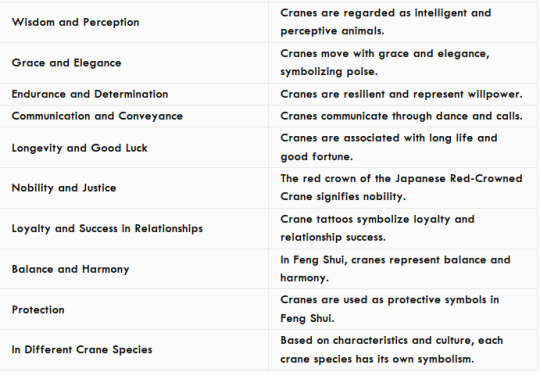
Source: HelloFearless.com
According to African culture, cranes symbolize love, long marriages, and peace.
Source: Allbirdsmag.com
Remember to follow my tag #Gingerpovs 💋
#sydcarmy#sydcarmy lovebirds#gingerpovs#the bear#the bear hulu#the bear fx#love story#lovers#romance#true love#unconditional love#cranes mean long lasting love#the bear meta#sydcarmy meta
16 notes
·
View notes
Text
Did you know...
The Buddha is a title, not a name (it means "Enlightened One").
The Buddha's name was Siddhartha Gautama, and he was a prince who gave up his worldly life in an effort to achieve spiritual enlightenment.

#buddhism#religion#asian religions#buddha#the buddha#little known fact#did you know#random fact#religion facts
7 notes
·
View notes
Text
"Nothing can harm you as much as your own thoughts unguarded"

Siddhartha Gautama, most commonly referred to as the Buddha, was a wandering ascetic and religious teacher who lived in South Asia, during the 6th or 5th century BCE and founded Buddhism.
Founder of Buddhism: Siddhartha Gautama, also known as the Buddha, founded Buddhism, one of the world's major religions, based on his teachings about overcoming suffering and achieving enlightenment.
Born as a Prince: He was born in Lumbini (modern-day Nepal) as a prince of the Shakya clan around the 5th to 6th century BCE, shielded from the hardships of the world.
The Four Sights: At age 29, he left his palace and encountered "The Four Sights"—an old man, a sick man, a corpse, and a wandering ascetic—which inspired him to seek answers to life's suffering.
Attained Enlightenment: After years of ascetic practices, he meditated under the Bodhi tree in Bodh Gaya and achieved enlightenment, becoming "the Buddha," or "the Awakened One.
"Teachings of the Middle Way: Buddha advocated the "Middle Way," avoiding extremes of indulgence and self-denial, and shared the Four Noble Truths and the Eightfold Path as the foundation of his teachings.
#Buddhism#Enlightenment#Bodhi Tree#Four Noble Truths#Eightfold Path#Middle Way#Meditation#Asceticism#Dharma#Nirvana#Shakya Clan#Lumbini#Bodh Gaya#Four Sights#Indian Philosophy#Spiritual Teacher#Karma#Sangha#Buddhist Scriptures#Siddhartha
5 notes
·
View notes